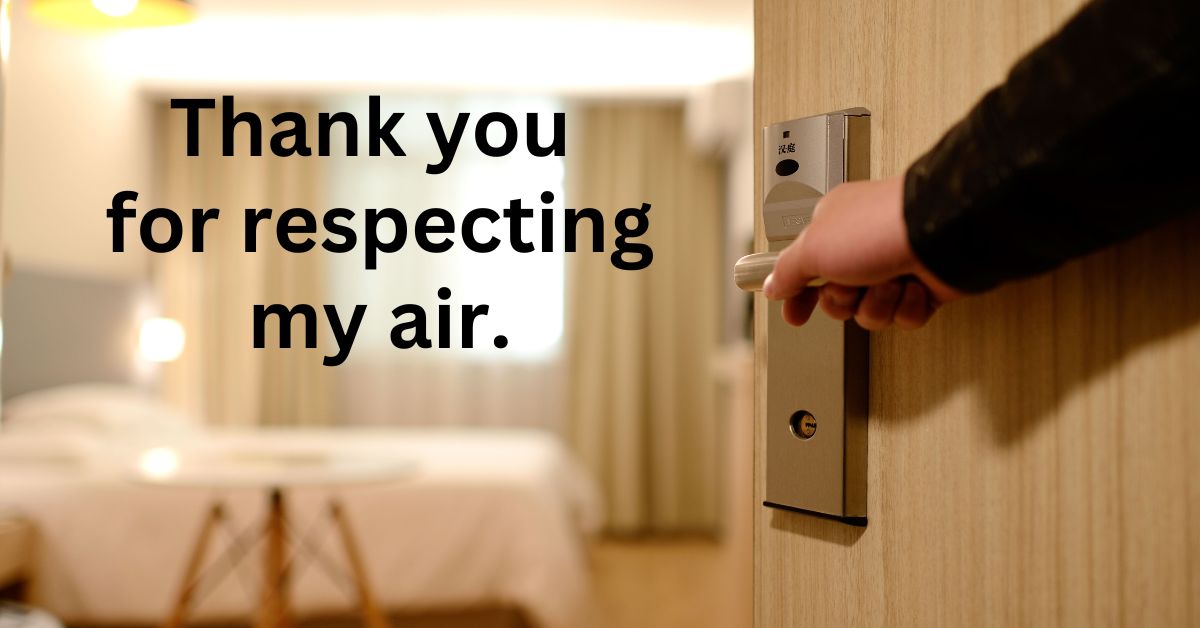Trigger Warning
If you are brain retraining for fragrance or chemical sensitivity, you might want to avoid this post. My advocacy effort began prior to learning about brain rewiring. I am trying to reduce my focus on this topic as I rewire. . . It’s a process.
WE Can Do This!
We CAN do this! WE can be influential in reducing fragrance chemicals. WE each have the ability to make change.
*IMPORTANT NOTE: There is a big difference between changing everything that needs to be changed and making small changes where we can. We need to be realistic, consistent, optimistic, kind, and persistent. As for myself, I’m working at limiting my efforts as I work on brain rewiring. I needed to travel, however, and this was a story worth sharing. It might take me a minute to get to what that experience was, but I’ll get there. Promise.
When I had a Pre-K classroom, one common statement that I worked to change was the simple phrase, I can’t do it. Any time a sweet 3 or 4-year-old told me, I can’t do it, Mrs. Simpson, I’d have them change their language to, I will try. There was no brighter light in the room than when a child would make that attempt and then look at me and tell me in a proud and joyful way, I did it!
Change in an industry that is creating billions of dollars for companies is not a simple task. To look at the large picture would be defeating and have each of us backing off saying, I can’t do it.
So let’s break it down into smaller efforts–efforts that can have each of us rejoicing as we tally up the times we can say: I did it!
Reduce Fragrance Chemicals Through Memes
One simple way to increase awareness is by sharing memes from my page, Fragrance Free Respect. Is this going to change the world? Of course not. By sharing these awareness memes, however, we’re planting seeds. We don’t know how or where they’ll grow, but some do grow.
We all know that too much fertilizer or over watering can kill a plant. I have over 350 memes that I rotate through my page. If you share each one of them you will surely turn off your Facebook friends. But share those that resonate with you. And please share with an open heart. It can be hard to understand that something so commonly sold isn’t really the best to be using.
Keep Facebook groups that you belong to in mind. Share memes to teacher groups. VRBO and AirBNB groups. Share them any time a particular meme may be fitting to a topic.
Remember to keep any added text kind. People are much more likely to listen to education from the heart than to demands, insults, or criticism.
Edit to Add. . .
I intended to add the following when I initially wrote this post. . .
It is easy to say be kind in our education. From the perspective of anyone whose health is so greatly affected by fragrance chemicals, it isn’t always so easy.
I don’t know about others, but I get angry. I get extremely angry. It is hard knowing how quickly one product can change the way I feel. A single laundry product, perfume, air freshener, or hand lotion. Bam.
I get angry.
When in a space too long, I also get emotional. That is just how I’m impacted. Brain fog, neck and back pain, and a hormonal type emotional PMS type of reaction.
It can be easy to transfer our anger and our emotions to those who use products that make us unwell. It isn’t their fault. Ads. Companies that push these products. Brainwashing. And the simple fact that most products contain fragrance chemicals.
We need to remember to keep our anger for the situation and the products separate from the emotions we express through our education. I know I’ve failed at this often. But with practice, it does get easier.
Many People Simply Don't Know
Sure, we all know people who say they don’t care about the chemicals behind their fragranced products. We know people who don’t respect the fact that they make many people sick. They simply like their scents and don’t feel the need to change for anyone else.
But many more people are just unaware.
Fragrance is a HUGE industry. Fragrance (in everything from detergents to toys) is so popular, so common, and so heavily advertised–why would anyone consider them to be unsafe? Surely if it wasn’t safe it wouldn’t be so prevalent, right? Most people have no idea that the chemicals used to create fragrance in any product are protected. As you can see in this video from the Environmental Working Group, fragrance is protected. The chemicals behind them are not required to be disclosed.
Ads. Ads are powerful. Ads are giving fragrance as much power now as they gave cigarettes in the 60’s. The tobacco industry made cigarettes seem cool, safe, and popular. They didn’t include the risks and dangers in their advertisements. Doctors smoked in offices and in hospitals. Passengers smoked on airplanes. And heck, we bought candy cigarettes as kids. They made us look as cool as the grown-ups and they prepared us to be the next generation of unsuspecting customers.
We know how that turned out, don’t we.
Many of us understand the devastation the fragrance industry is creating. We understand because we are living it. The average person, however, simply doesn’t know.
Increasing Numbers
Over 30% of the population is living with a fragrance sensitivity according to the following research: International Prevalence of Fragrance Sensitivity.
That study, by the way, was conducted before the bombardment of chemical (fragranced) disinfectants, or “pandemic products” as this study calls them: Pandemic Products and Volatile Chemical Emissions. It would be interesting to see a current study of the prevalence of fragrance sensitivity.
With such a large number of people affected, why is it that so many people still say they’ve never heard of it?–or that they don’t know anyone with a fragrance sensitivity?
For one, most of us simply avoid people and places that make us sick. The effort to avoid products that make a person sick keeps them more and more isolated.
Traveling With Fragrance Sensitivity
For many who live with fragrance sensitivity, travel simply doesn’t happen. Hotel bedding, or any vacation rental bedding laundered in unnecessary fragrance is a HUGE barrier. Air fresheners that fill lobbies, hallways, and rooms are HUGE barriers. And, as we all know, extra sanitizing requirements have contributed greatly to the amount of cleaning products and spray disinfectants used. Vacationing has become challenging.
How easy, however, would it be for facilities to avoid products that are not only preventing a large number of people from enjoying simple travel, but to avoid products that are simply harmful to all?
The use of fragrance-free laundry products. Easy. Avoid use of dryer sheets. Simple. NO air fresheners sprayed or spritzed. Simple (and money saving). Fragrance-free hand soap in the dispensers of public restrooms as well as in individual rooms. Simple. Change to hydrogen peroxide or vinegar for cleaning.
This can all be done. By avoiding fragranced products, doors become open to the many who currently avoid travel or who must travel but suffer the consequences.
Education From the Heart
We can all thank those who stood up against the tobacco industry for the fact that we can now visit public buildings, spend time in our work environments, and attend events without being having to inhale cigarette smoke and be covered in cigarette smell.
Those of us who lived through the 60’s, 70’s, and 80’s understand how intrusive that cloud of cigarette smoke was. Everywhere. That smoke cloud, however, has now been replaced with a toxic intrusion of another kind: Fragrance chemicals. We now need to be that same strong voice, speaking up for our right to clean air once again.
Reducing Fragrance Chemicals: A Personal Experience
I recently needed to travel and stay at a hotel away from home. This always requires phone calls with questions and requests. What do you use for laundry? What do you clean with? Do you use air fresheners? Do windows open?
It amazes me how many rentals (particularly VRBOs and AirBnBs) use fragranced laundry products. They are just trying to please their patrons, but it is far from pleasing. Once used, fragranced laundry products don’t simply wash out. Attempts to use fragrance-free detergent for fragrance sensitive guests isn’t really enough. Trying to explain this is a difficult point to get across.
Air fresheners. If they have been used, they are often embedded into walls and furniture. It is not easy to be fragrance free for a weekend guest if you’ve been a fragrance filled facility.
I called three local hotels in the area where I would be staying. Only one manager responded.
A Wonderful Stay!
The manager that responded was honest in that she couldn’t guarantee the room would be completely fragrance free. I was assured, though, that they would do their best. Honestly, it simply isn’t possible to make a guarantee of fragrance free. Prior products or air fresheners, or simply one person walking by with heavy perfume can invade the air. Her response gave me more confidence than if she told me it would be fine.
The manager told me they wouldn’t just wash my bedding and linens in fragrance-free detergent, they would use a new set of sheets that hadn’t been previously laundered. They wouldn’t use air fresheners in my room. And since the windows in that hotel open, they’d air the room out. Bonus–they wouldn’t rent that room for the few days prior to my stay.
I’m always hesitant. No matter how much an owner or manager works with me, I always still find the need to use my air purifier. This time, however, the only reason I needed my air purifier was for my seasonal allergies.
I’m a reasonably simple person. It doesn’t take much to make me happy. I was beyond happy. I was ecstatic. There was no detectable scent. But if you think about it, how sad is this?–to be happy to find an environment that doesn’t make me sick? This should be the norm, not the exception. And yet I am still filled with gratitude. Gratitude for a stranger who made her best effort to provide a stay where I had no repercussions what-so-ever.
(Disclaimer: I am less sensitive now than I was a year ago. I’ve been working on a brain rewiring program and I’m experiencing positive results. While I’m far less sensitive to scents, I still didn’t detect any scents in my room–and I didn’t have any reaction. None.)
Make Those Calls
We need to speak up in order for our fragrance-free needs to be known. We need to speak up for our RIGHT to CLEAN AIR (whether we have a fragrance sensitivity or not)! Ask those questions. Make those requests. Not everyone will work with special requests. But some will. And I can assure you–there are people out there who absolutely will do their best.
When simply sitting on a public seat can transfer fragranced laundry products from a previous inhabitant, it isn’t going to be easy to avoid or eliminate fragrance chemicals 100% outside of home. A transition to fragrance-free products isn’t going to make a facility fragrance-free overnight. But we need to keep communicating our needs. We need to keep educating. And we need to keep sharing how important clean air is for everyone.
A simple transition to fragrance-free detergents for ALL facility laundry. Easy. Remove all air fresheners. Easy.
*Even if you don’t have travel plans, contact a few hotels if you have some spare time. Practice those questions. Share your needs and your expectations. If we don’t call because we can’t travel, they won’t know the need exists.
*Also, share your positive travel experiences with others so we can all take advantage of those wonderful accommodations. Facebook Group: Environmentally Safe Travel.
Reduce Fragrance Chemicals in Schools and Health Care!
Speak up to your schools.
Speak up to health care providers and their office managers.
Educate them about the toxic realities.
Resources: Dr. Anne Steinemann / Resources
Join the Journey
Subscribe to Be Free Respect for blog updates and more.
Thank you!
You have successfully joined our subscriber list.





